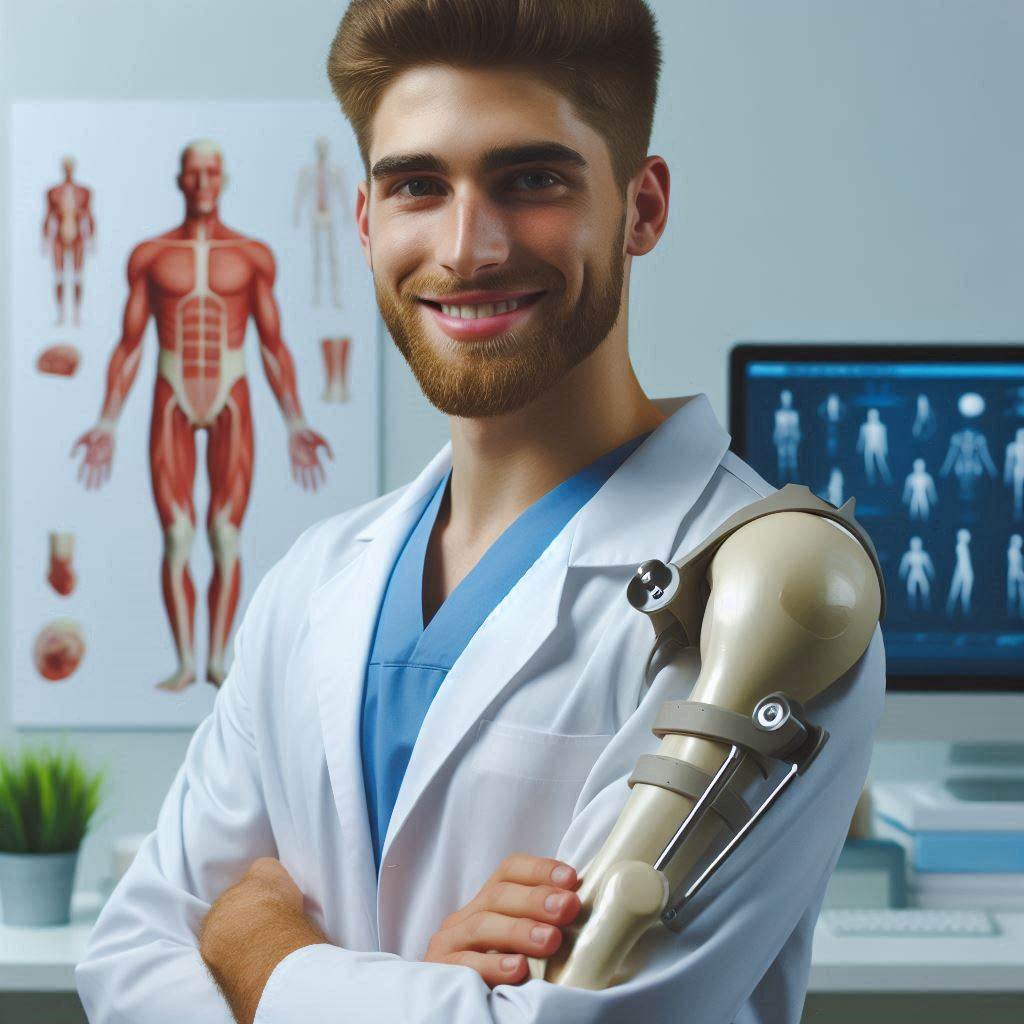Introduction
Orthotist Prosthetist Community Outreach and Advocacy: Orthotists and prosthetists play a crucial role in enhancing the quality of life for individuals with limb differences or orthopedic impairments.
Beyond their clinical expertise in designing and fitting orthotic and prosthetic devices, these healthcare professionals are also deeply involved in community outreach and advocacy efforts.
This blog post explores the significance of community engagement and advocacy within the orthotics and prosthetics field.
Community outreach forms the backbone of orthotist and prosthetist practices, extending their impact beyond clinical settings.
Outreach initiatives often involve educational programs, workshops, and public events aimed at raising awareness about the capabilities of orthotic and prosthetic devices.
By interacting directly with communities, orthotists and prosthetists can dispel myths, address misconceptions, and educate individuals about the life-changing benefits of their services.
Advocacy is another vital component of the orthotics and prosthetics profession.
In fact, community outreach and advocacy are integral to the practice of orthotics and prosthetics.
Through these efforts, orthotists and prosthetists not only enhance public awareness of their services but also advocate for policies that improve patient care and access to innovative technologies.
By actively engaging with communities, these healthcare professionals contribute to a more inclusive and supportive healthcare environment for individuals with limb impairments or orthopedic needs.
Benefits of Community Outreach
Providing education and awareness about orthotics/prosthetics
Orthotists and prosthetists play a crucial role in helping individuals with physical disabilities regain function and mobility.
By engaging in community outreach activities, they can educate the general public about the importance of orthotics and prosthetics in improving the quality of life for those in need.
This awareness can help reduce stigma and misconceptions surrounding orthotic and prosthetic devices.
Building relationships with local communities
Community outreach provides orthotists and prosthetists with the opportunity to connect with individuals and organizations within the community.
By participating in events, workshops, and seminars, they can establish relationships with local healthcare providers, advocacy groups, and community centers.
These connections are essential for networking and collaboration in the field of orthotics and prosthetics.
Establishing trust and credibility within the community
Orthotist Prosthetist Community Outreach and Advocacy: By actively engaging in community outreach efforts, orthotists and prosthetists can demonstrate their commitment to serving the needs of the community.
This establishes trust and credibility among community members, leading to increased awareness and support for orthotic and prosthetic services.
Building a positive reputation within the community can also attract potential clients and referrals for orthotic and prosthetic care.
Overall, community outreach is a valuable tool for orthotists and prosthetists to promote their services, educate the public, and build relationships within the community.
Transform Your Career Today
Unlock a personalized career strategy that drives real results. Get tailored advice and a roadmap designed just for you.
Start NowBy actively participating in outreach activities, they can make a positive impact on the lives of individuals with physical disabilities and raise awareness about the importance of orthotics and prosthetics in enhancing quality of life.
Read: Public Health Administration: Key Challenges and Solutions
Strategies for Community Engagement
Hosting Workshops and Seminars
Orthotist Prosthetist Community Outreach and Advocacy: One effective way to engage with the community is by organizing workshops and seminars.
This allows orthotists/prosthetists to educate people about the services they offer, the benefits of orthotics and prosthetics, and how they can improve quality of life.
By providing valuable information and answering questions from attendees, orthotists/prosthetists can raise awareness and build trust within the community.
Collaborating with Healthcare Providers and Organizations
Collaborating with other healthcare providers and organizations is essential for reaching a wider audience and maximizing impact.
By partnering with hospitals, clinics, rehabilitation centers, and other healthcare facilities, orthotists/prosthetists can expand their reach and provide comprehensive care to patients in need.
This collaboration also promotes interdisciplinary teamwork and fosters a network of support within the healthcare community.
Participating in Community Events and Health Fairs
Orthotist Prosthetist Community Outreach and Advocacy: Engaging with the community at events and health fairs is a great way for orthotists/prosthetists to interact with people outside of clinical settings.
By setting up booths, conducting demonstrations, and offering free consultations, orthotists/prosthetists can showcase their expertise and demonstrate the value of their services.
This hands-on approach allows them to connect with potential clients, establish relationships, and promote the importance of orthotics and prosthetics in enhancing mobility and restoring function.
Basically, these strategies for community engagement enable orthotists/prosthetists to raise awareness, educate the public, and advocate for the profession.
By actively participating in outreach efforts, orthotists/prosthetists can make a meaningful impact in their communities and improve access to quality orthotic and prosthetic care for individuals in need.
Read: How Technology is Transforming Orthotics and Prosthetics
Advocacy Efforts in the Field
Orthotists and Prosthetists play a vital role in advocating for individuals in need of orthotic/prosthetic care.
ere are some key advocacy efforts in the field:
Supporting legislation that promotes access to orthotic/prosthetic care
- Advocating for laws that ensure individuals have timely access to quality orthotic/prosthetic services.
- Promoting policies that address barriers to care, such as lack of coverage or limited provider networks.
- Working with lawmakers to develop regulations that prioritize patient well-being and safety.
Advocating for insurance coverage for orthotic/prosthetic devices
- Raising awareness about the financial impact of not having insurance coverage for these essential devices.
- Campaigning for policies that mandate insurance companies to cover orthotic/prosthetic devices as part of their benefits.
- Collaborating with insurance providers to streamline the reimbursement process for orthotic/prosthetic services.
Raising awareness about the importance of orthotic/prosthetic services
- Engaging in educational campaigns to inform the public about the role of orthotists/prosthetists in improving quality of life.
- Participating in community events to showcase the impact of orthotic/prosthetic interventions on individuals’ mobility and independence.
- Collaborating with organizations and advocacy groups to amplify the importance of orthotic/prosthetic care in healthcare settings.
In essence, the orthotist/prosthetist community continues to be at the forefront of advocacy efforts to ensure individuals have access to essential orthotic/prosthetic care.
Through supporting legislation, advocating for insurance coverage, and raising awareness, these professionals are making a significant impact on the lives of those in need of orthotic/prosthetic services.
Read: Public Health Administrator vs. Health Services Manager

Working with Patients and Families
Orthotist/Prosthetists play a crucial role in providing support and resources to patients and their families.
Transform Your Career Today
Unlock a personalized career strategy that drives real results. Get tailored advice and a roadmap designed just for you.
Start NowThis involves not only fitting and fabricating orthotic and prosthetic devices but also offering emotional and educational support throughout the process.
Providing Support and Resources
- Helping patients navigate insurance coverage for their devices
- Connecting patients with community resources for additional support
- Educating patients and families on proper device use and maintenance
- Addressing any concerns or questions patients may have regarding their orthotic or prosthetic devices
Empowering Patients to Advocate for Their Own Care
- Encouraging patients to voice their needs and preferences in the fitting process
- Teaching patients how to effectively communicate with healthcare providers
- Empowering patients to self-advocate for necessary adjustments or modifications to their devices
Offering Counseling and Guidance on Navigating the Healthcare System
- Assisting patients in scheduling appointments and coordinating care with other healthcare professionals
- Providing information on available support groups or counseling services for patients and families
- Guiding patients through the process of obtaining prior authorizations for their orthotic or prosthetic devices
- Helping patients understand their rights and responsibilities within the healthcare system
By working closely with patients and their families, Orthotist/Prosthetists can improve overall outcomes and ensure that individuals receive the care and support they need to thrive with their orthotic or prosthetic devices.
Read: Work Environments for Public Health Administrators
Collaborating with Professional Organizations
Orthotists and prosthetists play a crucial role in the healthcare industry, providing patients with orthotic and prosthetic devices to improve their quality of life.
However, their impact can be amplified through collaboration with professional organizations.
Joining Professional Associations
One way orthotists and prosthetists can enhance their outreach and advocacy efforts is by joining professional associations dedicated to their field.
These organizations offer resources, support, and networking opportunities that can help professionals stay informed about industry trends and best practices.
By becoming members of these associations, orthotists and prosthetists can access a wealth of information and training opportunities that can further develop their skills and knowledge.
Additionally, being part of a larger professional community allows for collaboration and sharing of ideas, ultimately benefiting patients and the profession as a whole.
Participating in Advocacy Campaigns
Orthotist Prosthetist Community Outreach and Advocacy: Advocacy is a critical aspect of outreach for orthotists and prosthetists.
By engaging in advocacy campaigns and initiatives, professionals can raise awareness about the importance of orthotic and prosthetic care, advocate for policy changes that benefit patients, and address issues affecting the profession.
Professional organizations often lead advocacy efforts, providing orthotists and prosthetists with a platform to make their voices heard and effect change.
Through collective advocacy, professionals can work towards improving access to care, advancing research and innovation, and promoting the value of orthotic and prosthetic services.
Networking with Healthcare Professionals
Collaboration with other healthcare professionals is essential for orthotists and prosthetists to maximize their impact.
Networking with physicians, physical therapists, and other healthcare providers builds relationships for collaborative, holistic patient care.
Participating in multidisciplinary teams allows orthotists and prosthetists to contribute their expertise while learning from other healthcare professionals.
This integrated approach can result in more comprehensive treatment plans and better outcomes for patients, highlighting the importance of teamwork in healthcare delivery.
Orthotists and prosthetists expand outreach by collaborating with professional organizations, joining advocacy campaigns, and networking with healthcare professionals.
Orthotists and prosthetists can significantly impact the healthcare community by collaborating towards improving patient care and advancing the profession.
Impact of Community Outreach and Advocacy
Improving access to orthotic/prosthetic services for underserved populations
Orthotist Prosthetist Community Outreach and Advocacy: Orthotists/prosthetists can reach individuals by partnering with community organizations and hosting outreach events, ensuring access to services.
Transform Your Career Today
Unlock a personalized career strategy that drives real results. Get tailored advice and a roadmap designed just for you.
Start NowThis can include those in rural areas, low-income communities, or marginalized populations.
By increasing accessibility, more people can benefit from the support and care provided by orthotists/prosthetists.
Enhancing the public perception of orthotist/prosthetist services
Community outreach and advocacy efforts can help raise awareness about the importance and effectiveness of orthotic/prosthetic services.
Orthotists/prosthetists educate the public through workshops, presentations, and events, debunking myths to increase trust and confidence in their profession.
This can lead to more individuals seeking out these services when needed.
Strengthening relationships with referral sources and healthcare partners
Through community outreach and advocacy, orthotists/prothetists can connect with other healthcare providers, referral sources, and community organizations.
Building strong relationships with these partners is essential for ensuring a seamless and coordinated approach to patient care.
Orthotists/prosthetists can enhance patient care by collaborating on outreach events, sharing resources, and establishing referral networks. This improves care quality and continuity.
This can lead to more effective treatment outcomes and better overall patient satisfaction.
In a nutshell, community outreach and advocacy play a vital role in the field of orthotics/prosthetics.
These efforts increase service access for underserved populations, boost public perception, strengthen healthcare partnerships, and improve patient care outcomes.
Orthotists/prosthetists actively engage with the community to ensure their services are valued and utilized fully.
Conclusion
Orthotist Prosthetist Community Outreach and Advocacy: Orthotists/prosthetists engage with local organizations and schools to raise awareness about their profession.
Advocacy involves working with policymakers to promote legislation that benefits orthotics and prosthetics patients.
Community outreach and advocacy efforts help patients access quality care and resources for their orthotic/prosthetic needs.
Participating in community outreach and advocacy initiatives allows orthotists/prosthetists to expand their networks and skills.
Community efforts are crucial for raising awareness and ensuring the continued development of the orthotics/prosthetics field.
Orthotists/prosthetists should continue their engagement in community outreach and advocacy to promote positive change.
In summary, community outreach and advocacy are vital for orthotists/prosthetists to support patients and advance their profession.
Professionals are encouraged to remain actively involved in community efforts and advocacy initiatives to drive positive impact and foster growth in the field.
Transform Your Career Today
Unlock a personalized career strategy that drives real results. Get tailored advice and a roadmap designed just for you.
Start Now



